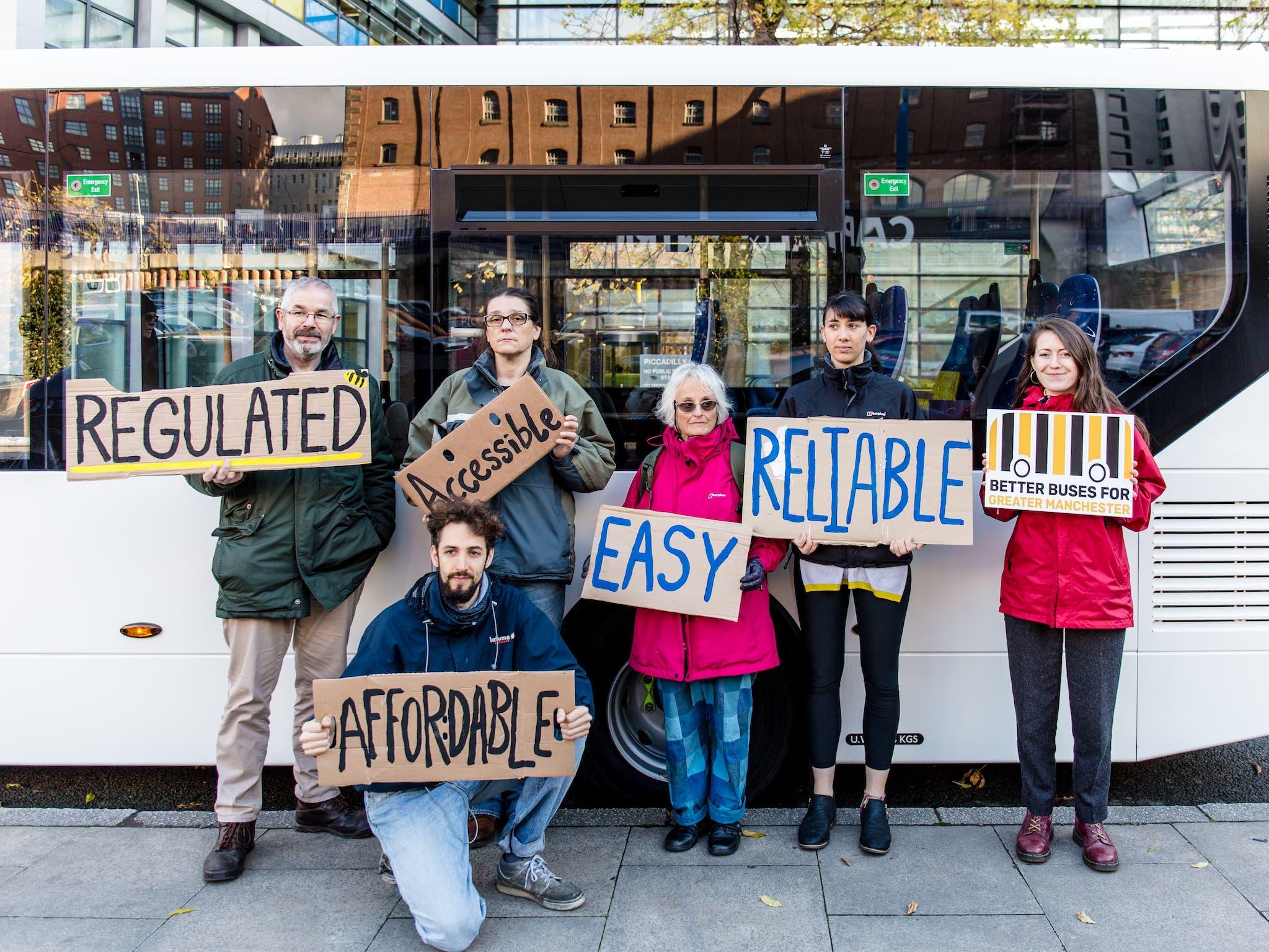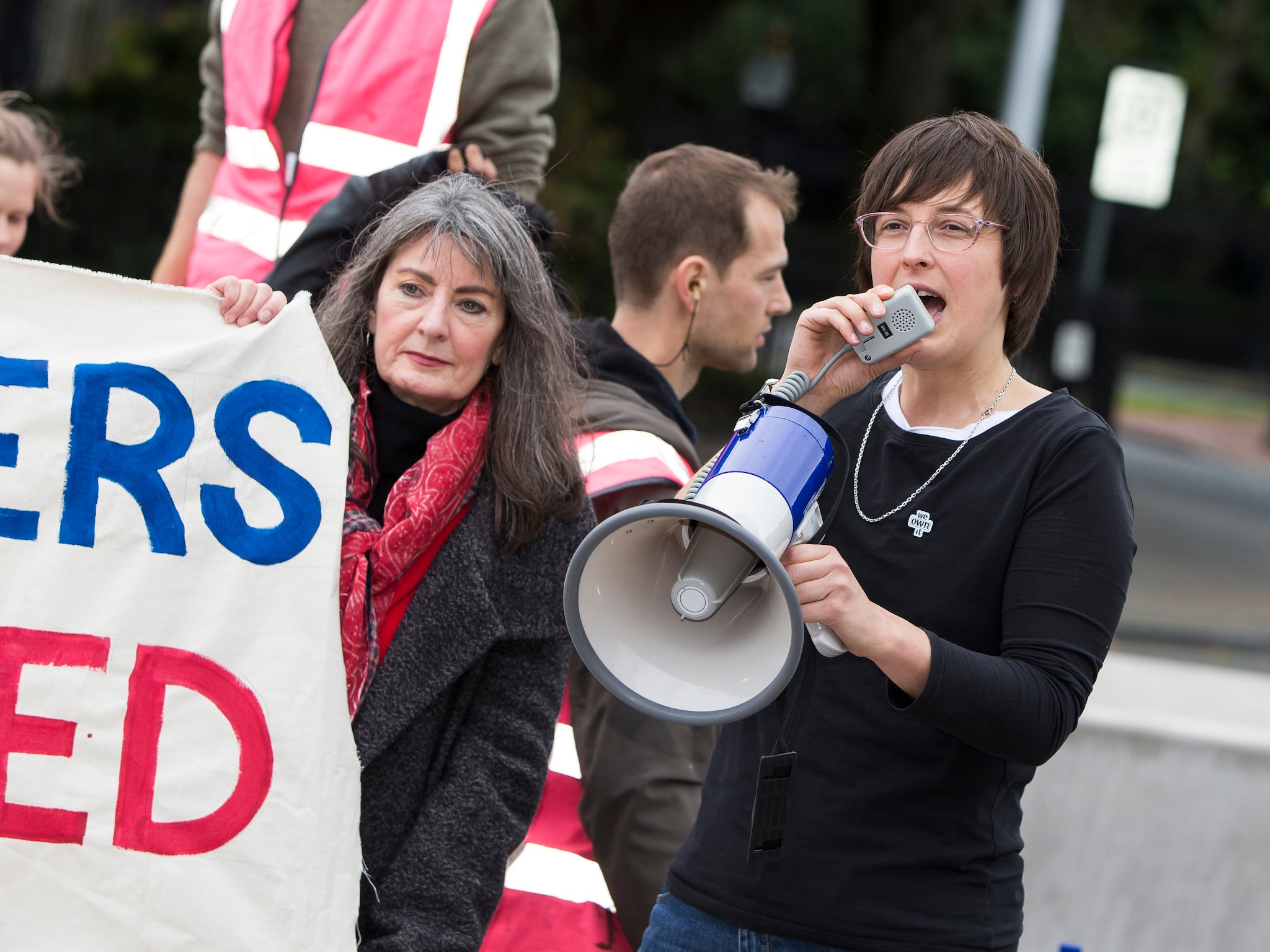Campaigns to reverse the privatisation of buses gain pace
The Start-up: In Manchester and Glasgow, debate is heating up about Andy Burnham’s franchise plan and the sale of First Bus

Glasgow should be the ideal place to take public transport. The city has the biggest suburban railway network outside London. It’s one of only a handful of places, including London and Newcastle, to have a subway which, when it opened in the late 19th century, was the envy of the world.
Yet passengers say the system doesn’t work. Bus use in the southwest of Scotland and the Strathclyde area has declined 38 per cent over a decade, compared to 22 per cent for Scotland as a whole. In 2018, a single fare on Glasgow’s privatised First Bus service was £2.40, compared to £1.70 on Edinburgh’s publicly owned Lothian buses and just £1.50 on London’s buses, which are regulated by Transport for London.
Ellie Harrison is a cofounder of the Get Glasgow Moving campaign, which is calling for a fully integrated, publicly owned transport system for Glasgow. She says passengers coming into the city from the south face a confusing array of uncoordinated transport options, including buses competing with train lines, separate tickets for every service, and dislocated timetables resulting in long waiting times.
“It’s not rocket science,” Harrison says. “The only reason we haven’t got an integrated system in Glasgow is because the privatisation of our buses and trains means there is no cooperation between the different competing operators.”
Campaigns to bring buses back into public ownership are gaining pace across the UK, more than 30 years after Margaret Thatcher deregulated buses outside London, allowing them to be run by private companies with no public oversight. Five companies now own 70 per cent of the market: Arriva, First Bus, Go-Ahead, National Express and Stagecoach.
Since the Eighties, local authorities have stepped in to pay subsidies on routes that do not make a profit. In 2017-18, private bus companies benefited from £2.18bn of public subsidies. However, since the advent of austerity in 2010 local authorities in England and Wales have cut £78m in funding, according to research from UK advocacy group Campaign for Better Transport. More than 2,400 routes have been reduced or withdrawn altogether, leaving passengers stranded on axed routes.

In Manchester, Andy Burnham, the metro mayor, has announced plans to franchise the city’s buses, bringing them under public control using the same 2017 Bus Act that bans local authorities from establishing municipal bus services. Under the new system, Manchester would be the only place outside London to bring the buses under public control, allowing passengers to travel between buses, trains and trams with capped fares and a single Oyster-like ticketing system.
The plan to franchise the buses in Manchester was launched on 25 June and comes after months of work by Better Buses, a campaign run locally by the organisation We Own It, which is calling for public ownership of public services nationwide. “There’s so much evidence to suggest that privatised buses are bad for our local economy,” says Pascale Robinson of Better Buses.
Poor public transport affects those with the least the most. Forty per cent of the lowest income households in the UK do not have access to cars. This group disproportionately includes woman heads of households, children, young and older people, black and minority ethnic people and disabled people, according to government statistics.
Families without access to a car struggle to reach jobs, schools and other public services when public provisions are cut. More than half of the working-age population of the UK lives in areas where there are fewer jobs than average within 45 minutes of local services. Meanwhile, 66 per cent of elderly people cannot reach a hospital within 30 minutes by public transport.
Since last summer, Get Glasgow Moving has called for amendments to the Transport Bill in Scotland. Rather than copying the Bus Act in England, which bans the remunicipalisation, or public ownership, of buses, campaigners have demanded that the bill makes it legal for Glasgow to run its own services in the near future. Those amendments have been included in the current iteration of the bill.
This alone gives Harrison and the other campaigners reason to be cheerful. “That is a massive step forward,” Harrison says. “Our bill looks like it will be slightly better than the bill in England. It will be legal for Glasgow for run its own bus service in the near future.”
Then in June, FirstGroup announced it will sell off its UK bus division and potentially withdraw from rail operations, after the company recorded a pre-tax loss of £98m, down from £327m the year before.
Harrison says FirstGroup’s exit from the Glasgow bus network provides “an amazing opportunity” for Glasgow City Council to bring bus operations back under the control of the local authority. “It’s a serendipitous moment, rather than starting from scratch you can buy all the assets and get a network like [Edinburgh’s publicly owned service] Lothian up and running overnight.”
Campaigners are hoping for a system like the Verkehrsverbund (Transport Association) in Munich, Germany. The City of Munich has the power to design and develop the whole public transport network, including setting the timetables, organising a unified fare system and providing passenger information, under the principle of “one network, one timetable, one ticket”.
Until the sale, FirstGroup says it will continue to operate services in Glasgow as normal. “Last month we announced that we will be pursuing strategic options to separate First Bus from FirstGroup. This could be via a sale – either as a whole or in part – or by other means such as a demerger or partnership,” a spokesperson said.
Glasgow City Council says it is not in a position to buy First Bus in Glasgow but is looking at all reasonable and practical options for improving services. “The reality is that a significant change in legislation and also substantial resources would be required for us to buy a bus company, neither of which are in place,” a spokesperson said.
Harrison says the campaign is just getting started. This summer, Get Glasgow Moving is going on the road, encouraging people to write to their MPs to ask for public ownership. She says: “The amount of public money that has gone into the sector since privatisation, we could have bought the buses back a million times over!”
Join our commenting forum
Join thought-provoking conversations, follow other Independent readers and see their replies
Comments
Bookmark popover
Removed from bookmarks